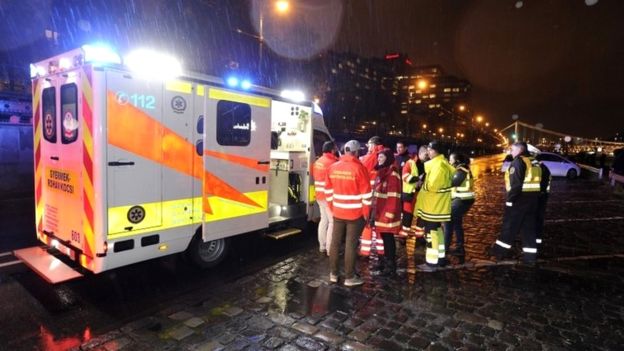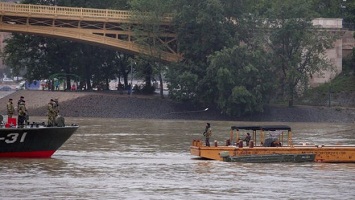Hungary boat capsizes: Seven South Koreans die on Danube


Seven South Korean tourists have died and another 21 people are missing after a boat sank on the Danube river in Hungary’s capital, Budapest.Thirty South Korean tourists and three tour guides, as well as two Hungarian crew, were on the tour boat when it collided with another vessel.The incident occurred just after 21:00 local time (19:00 GMT) on Wednesday.
Seven people have been rescued, and a massive search operation is continuing on a river swollen by heavy rainfall.The rain had led to strong currents on the Danube, and rescue teams say there is little hope of finding more survivors.It was not immediately clear which vessel was responsible for the collision, a rare incident on the Danube where navigation is busy but generally safe.
A criminal investigation has been launched.The boat that sank near the parliament building in central Budapest was identified as the Hableany, or Mermaid. It has two decks and a capacity of 45 people for sightseeing trips.
A still from CCTV footage purportedly shows the two vessels (encircled) just minutes before the collision
CCTV footage has emerged showing the 27-m (89-ft) Hableany and a larger tour boat, the 135-m Viking Sigyn, travelling in the same direction and colliding near the Margit (Margaret) Bridge.
The boat sank within seven seconds after the collision, police spokesman Adrian Pal said.Emergency crews discovered the wreckage of the Mermaid, built in 1949 in the former Soviet Union, on the riverbed near the Margaret Bridge and were preparing to lift it.
Most of the South Korean tourists were aged between 40 and 50 but the group also included a six-year-old child and a man in his 70s, South Korea’s Yonhap news agency reported.Hungarian authorities search for remains from a tourist boat that capsized on the DanubeImage copyrightGETTY IMAGES
Image caption
Boats, divers, spotlights, and radar scanning are involved in the massive search operation
The captain of the Swiss-registered Viking Sigyn was questioned on Wednesday night.
Meanwhile, Imre Horvath, the head of the Hungarian National Shipping Association, said he believed it was a human error, MTI news agency reported, although he gave no further details.Seven survivors were taken to hospital with “hypothermia and shock symptoms”, said Pal Gyorfi, a spokesman for Hungarian emergency services.
They were all rescued by other boats within 30 minutes of the accident.A 31-year-old passenger, identified only by her surname Jung, told Yonhap: “The current was so fast and people were floating away.”
Another survivor, a 32-year-old woman named as Yoon, said she believed some 10 people who remained in the cabin had not been able to escape. “The boat flipped instantly and capsized.”Those pulled from the water were taken to hospital with hypothermia and shock symptomsThe Hableany boat – seen in this archive photo – has a capacity of 45 people for sightseeing tripsThe rescue effort continued on Thursday with boats, divers, spotlights, and radar scanning along the river, where the temperature of the water was between 10C and 12C (50F-54F).But teams warned that, as more time passed, the strong currents would carry people further downstream, lessening the chances of finding survivors.
The seven confirmed victims were not wearing life jackets and three of them were found several kilometres from the site of the collision, police said.There has been a dramatic increase in river traffic in recent years as tourism increases in Budapest.Andras Kurbely, a crew member of another large cruise ship with 27 years of experience on the Danube, told the BBC that this was an accident he and others have long worried about.
“It’s just not healthy to have so many large ships, which are much more powerful and harder to manoeuvre, carving a route between so many smaller boats.”In his view, the practice of the river cruisers, which sail up and down the river between the five main bridges as an after-dinner excursion for their passengers, should be stopped.
The South Korean foreign ministry said a team of officials would be sent to Hungary, adding that counselling would be made available to victims’ families.South Korean President Moon Jae-in said his government planned “to co-operate with the Hungarian government to thoroughly investigate the cause of the accident”.
For South Koreans, the sinking is a painful reminder of the Sewol disaster in 2014, the BBC’s Laura Bicker in Seuol reports.
The ferry of that name sank off South Korea’s Jindo island, killing 304 people, almost all of them schoolchildren on a trip.Sewol disaster ferry raised in South Korea after three years.The sinking was blamed on a combination of illegal redesigns, cargo overloading, the inexperience of the crew, and lax government regulations.The ship’s captain was later convicted of murder.





